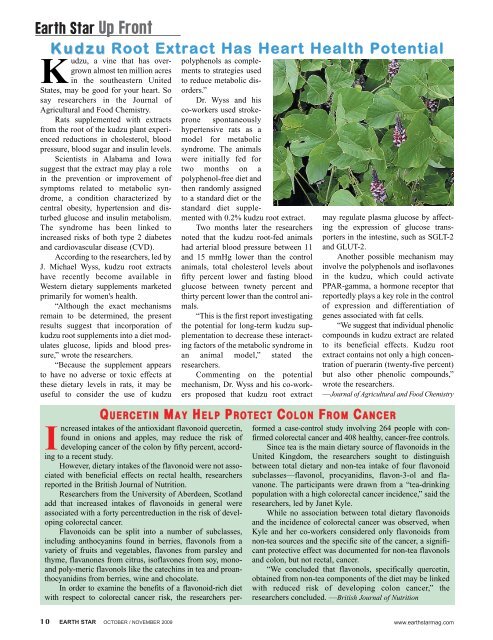WILD ATTRACTION WILD ATTRACTION - Earthstar
WILD ATTRACTION WILD ATTRACTION - Earthstar
WILD ATTRACTION WILD ATTRACTION - Earthstar
- No tags were found...
Create successful ePaper yourself
Turn your PDF publications into a flip-book with our unique Google optimized e-Paper software.
Earth Star Up FrontK u d z u Root Extract Has Heart Health PotentialKudzu, a vine that has overgrownalmost ten million acresin the southeastern UnitedStates, may be good for your heart. Sosay researchers in the Journal ofAgricultural and Food Chemistry.Rats supplemented with extractsfrom the root of the kudzu plant experiencedreductions in cholesterol, bloodpressure, blood sugar and insulin levels.Scientists in Alabama and Iowasuggest that the extract may play a rolein the prevention or improvement ofsymptoms related to metabolic syndrome,a condition characterized bycentral obesity, hypertension and disturbedglucose and insulin metabolism.The syndrome has been linked toincreased risks of both type 2 diabetesand cardiovascular disease (CVD).According to the researchers, led byJ. Michael Wyss, kudzu root extractshave recently become available inWestern dietary supplements marketedprimarily for women's health.“Although the exact mechanismsremain to be determined, the presentresults suggest that incorporation ofkudzu root supplements into a diet modulatesglucose, lipids and blood pressure,”wrote the researchers.“Because the supplement appearsto have no adverse or toxic effects atthese dietary levels in rats, it may beuseful to consider the use of kudzupolyphenols as complementsto strategies usedto reduce metabolic disorders.”Dr. Wyss and hisco-workers used strokepronespontaneouslyhypertensive rats as amodel for metabolicsyndrome. The animalswere initially fed fortwo months on apolyphenol-free diet andthen randomly assignedto a standard diet or thestandard diet supplementedwith 0.2% kudzu root extract.Two months later the researchersnoted that the kudzu root-fed animalshad arterial blood pressure between 11and 15 mmHg lower than the controlanimals, total cholesterol levels aboutfifty percent lower and fasting bloodglucose between twnety percent andthirty percent lower than the control animals.“This is the first report investigatingthe potential for long-term kudzu supplementationto decrease these interactingfactors of the metabolic syndrome inan animal model,” stated theresearchers.Commenting on the potentialmechanism, Dr. Wyss and his co-workersproposed that kudzu root extractmay regulate plasma glucose by affectingthe expression of glucose transportersin the intestine, such as SGLT-2and GLUT-2.Another possible mechanism mayinvolve the polyphenols and isoflavonesin the kudzu, which could activatePPAR-gamma, a hormone receptor thatreportedly plays a key role in the controlof expression and differentiation ofgenes associated with fat cells.“We suggest that individual phenoliccompounds in kudzu extract are relatedto its beneficial effects. Kudzu rootextract contains not only a high concentrationof puerarin (twenty-five percent)but also other phenolic compounds,”wrote the researchers.—Journal of Agricultural and Food ChemistryIncreased intakes of the antioxidant flavonoid quercetin,found in onions and apples, may reduce the risk ofdeveloping cancer of the colon by fifty percent, accordingto a recent study.However, dietary intakes of the flavonoid were not associatedwith beneficial effects on rectal health, researchersreported in the British Journal of Nutrition.Researchers from the University of Aberdeen, Scotlandadd that increased intakes of flavonoids in general wereassociated with a forty percentreduction in the risk of developingcolorectal cancer.Flavonoids can be split into a number of subclasses,including anthocyanins found in berries, flavonols from avariety of fruits and vegetables, flavones from parsley andthyme, flavanones from citrus, isoflavones from soy, monoandpoly-meric flavonols like the catechins in tea and proanthocyanidinsfrom berries, wine and chocolate.In order to examine the benefits of a flavonoid-rich dietwith respect to colorectal cancer risk, the researchers per-QUERCETIN MA Y HELP PROTECT COLON FROM CANCERformed a case-control study involving 264 people with confirmedcolorectal cancer and 408 healthy, cancer-free controls.Since tea is the main dietary source of flavonoids in theUnited Kingdom, the researchers sought to distinguishbetween total dietary and non-tea intake of four flavonoidsubclasses—flavonol, procyanidins, flavon-3-ol and flavanone.The participants were drawn from a “tea-drinkingpopulation with a high colorectal cancer incidence,” said theresearchers, led by Janet Kyle.While no association between total dietary flavonoidsand the incidence of colorectal cancer was observed, whenKyle and her co-workers considered only flavonoids fromnon-tea sources and the specific site of the cancer, a significantprotective effect was documented for non-tea flavonolsand colon, but not rectal, cancer.“We concluded that flavonols, specifically quercetin,obtained from non-tea components of the diet may be linkedwith reduced risk of developing colon cancer,” theresearchers concluded. —British Journal of Nutrition10 EARTH STAR OCTOBER / NOVEMBER 2009 www.earthstarmag.com
















